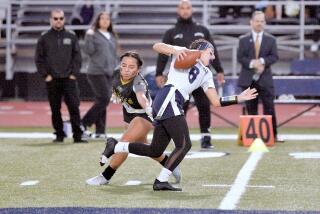Ventura Christian School Sues City
A struggling Christian high school on Wednesday sued the city of Ventura, alleging officials are deliberately driving it toward bankruptcy with seldom-enforced land-use rules.
In a lawsuit filed in U.S. District Court in Los Angeles, Ventura County Christian High School contended the city’s allegedly arbitrary shutdown of portable classrooms on the midtown campus has cost the school nearly one-third of its enrollment.
Unless a judge allows use of the buildings, the school could be forced to close, the lawsuit said.
Meanwhile, classes continue -- though some have been dropped -- in rented space at a church across the street.
The lawsuit is the latest problem to beset the five-acre patch that is home to the once-stately Washington School, a 1925 building that became a haunt for vagrants and vandals after it was shut in 1983. Three years ago, the Ventura Unified School District agreed to lease the property to the Christian school for $1 a year, with the private institution agreeing to transform it into a working campus.
But the future of the 20-year deal was threatened last fall when city officials insisted on a number of expensive improvements the school said it could not afford.
Robert Boehm, Ventura’s city attorney, declined comment on the suit, saying he would need time to study it.
Bill Bays, a Christian High School parent and one of its key financial donors, said the school’s problems stem partly from an anti-religious bias among some city employees.
“We played by the rules from the beginning and never asked anyone for special treatment,” he said. “We’re just asking not to be discriminated against.”
The lawsuit is based on the Religious Land Use and Institutionalized Persons Act of 2000, a federal law that requires government to treat religious and secular groups equally.
The school’s problems began last October, when two of its neighbors complained to the city that the portable classroom buildings had been set too close to their backyards. That prompted city officials to demand the school acquire a conditional use permit before the buildings could be used.
But the permit would have meant some big expenses, including $40,000 in traffic mitigation fees and at least $20,000 for moving the portables to another site on campus. On top of that, the school had already spent about $100,000 and obtained at least that much in free services as the old building got a fresh coat of paint, a new roof and a wrought-iron fence.
Besides, school officials were convinced they were answerable not to the city but to their landlords at the school district.
“Unlike other properties throughout the city, school district properties are regulated by the school district,” contended Bays, a plaintiff in the suit. “The city has no authority here.”
School officials bolstered that belief by researching other private groups operating out of portable buildings at Ventura public schools. They found at least eight sites where day-care centers and other businesses were not required by the city to obtain conditional use permits, according to the suit. Also, a Native American group that recently left a leased building on the Washington Elementary School campus had not been forced to obtain a permit, the suit said.
The suit also alluded to alleged anti-Christian comments by city staff members.
“Who do you Christians think you are?” a city planner was alleged to have remarked at a 1996 meeting. “You won’t ever get that property. It has to go to the city first and it is going to be low-income housing.”
Lisa Darby, a Christian High School board member and another of the suit’s plaintiffs, said she was at that meeting.
“I told him I believe in miracles,” she said.
Jack Tingstrom was Ventura’s mayor when he brokered the arrangement between the school district and the Christian high school. On Wednesday, he said he was angered by the city’s recent demands of the school.
“I think it’s criminal and uncalled for,” he said. “After all these years, why all of a sudden did they do this? It just doesn’t pass the smell test.”
But Don Austin, an attorney for the Ventura Unified School District, said he thought officials of the private high school may have misinterpreted the law. While construction of public schools is regulated by the state, private facilities on public campuses can be regulated by the city, he said.
He suggested the problem hadn’t arisen at other Ventura schools because local residents may not have complained to the city.
Before the lawsuit is heard by a jury, the school will ask a judge for an order allowing occupancy of the portables, said Nicholas P. Miller, a Los Angeles attorney representing the school.
Until then, the school must pay about $3,400 a month to rent the unused buildings as well as pay rent for its current classroom space.
The school’s enrollment has dwindled from 90 to 54 in the past year, according to the suit.
If the suit fails, the school will go on, Bays said, vowing, “We’ll persevere at some level in another place.”
More to Read
Sign up for Essential California
The most important California stories and recommendations in your inbox every morning.
You may occasionally receive promotional content from the Los Angeles Times.










